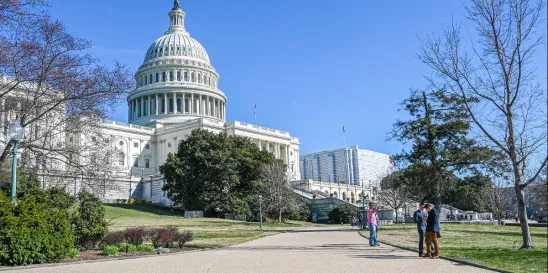On 26 January 2024, Washington, D.C.’s Office of the Deputy Mayor for Planning and Economic Development (DMPED) published a Notice of Proposed Rulemaking to implement tax abatements to be made available to developers of residential housing in the District’s downtown business district. These tax abatements were initially authorized by legislation passed by D.C. Council in September 2022.
BACKGROUND
Like many cities throughout the United States, Washington, D.C. is contending with the twin problems of high vacancy in commercial office buildings and an undersupply of housing. According to Cushman & Wakefield (C&W), the overall office vacancy rate in the District reached 20.7% in the fourth quarter of 2023, the highest mark in the last 30 years. C&W attributes the high office vacancy rate to a combination of factors, including excess new supply, increased hybrid work policies, and downsizing among some of the District’s largest occupier groups, especially the federal government and the legal and not-for-profit sectors. On the other hand, the housing stock is short by approximately 134,000 units according to a Zillow analysis published in June 2023. Converting office properties to residential use can help to alleviate these challenges; but conversions can face legal and engineering hurdles, as they frequently require expensive renovations that may be challenging to finance in a higher interest rate environment.
Understanding these challenges, the municipal government has been working on creative solutions to incentivize conversion of office properties to housing. These local efforts predate the pandemic, as Council passed legislation launching the Office-to-Affordable-Housing Task Force in 2018. Notwithstanding such legislation, the pandemic led to increased office vacancies, while residential housing strain has also become more acute.
To encourage adaptive reuse, the government has implemented a variety of programs intended to make the conversion process easier in the District. Certain initiatives are regulatory in nature, such as when the District’s Department of Buildings amended municipal regulations in October 2022 to expand the number of commercial buildings in the central business district eligible to convert to residential use as of right without satisfying certain requirements usually applicable to residential development. Other initiatives aim to enhance the economic viability of conversion projects, thereby enabling developers to better attract capital investment.
2022 AUTHORIZING LEGISLATION
In September 2022, Council passed legislation authorizing the Mayor to approve up to 20 years of real property tax abatements for properties located in the central business district which are converted to residential use and contain at least 10 residential units. The legislation enhances the feasibility of conversion projects by providing abatements, subject to the availability of funding,1 to eligible properties of up to:
- US$2.5 million for fiscal years 2024 to 2026;
- US$6.8 million for fiscal year 2027;
- US$41 million for fiscal year 2028; and
- 104% of the prior year’s maximum available abatement for each year thereafter.
Residential units at eligible properties must maintain a minimum of at least 10% of units which remain affordable during the abatement period to households earning no more than 60% of median family income,2 and at least 18% of units which remain affordable during the abatement period to households earning no more than 80% of median family income.3
The legislation also loosens regulatory requirements typically applicable to real estate projects receiving tax abatements. While the owner of an eligible project must enter into a First Source Employment Agreement which obligates the owner to use the District’s Department of Employment Services as its first source of seeking employees and hire District residents for at least 51% of new jobs created by the project’s operation, these requirements do not apply to the project’s construction and development phases, which typically involve employment of many more individuals. Moreover, eligible projects are exempt from complying with the District’s Tenant Opportunity to Purchase Act for the first sale within 10 years after the project receives a certificate of occupancy.
PROPOSED RULEMAKING
Working to further attract residents to the District and optimize use of existing buildings, DMPED is now proposing rules to implement the 2022 downtown tax abatement legislation. The proposed rules detail a competitive application process. The proposed rules first specify the criteria by which DMPED will evaluate the applications. DMPED will first consider the benefit that the proposed project will bring both to the immediate area surrounding the development and to the District as a whole when making initial eligibility determinations. DMPED will then examine the proposed project’s financial feasibility and need, based on pro formas or other financial analyses submitted with the application for tax abatement when determining the amount of abatement awarded to an eligible project. The proposed rules then detail the required content of applications for abatement awards, including such financial analyses as well as information relevant to the project’s compliance with the legislation’s affordable housing requirements. In addition, the proposed rules impose a 30 business day time period during which DMPED must approve or deny an application, request additional information, or inform the applicant that DMPED requires additional time to complete its review.
Notably, the proposed rules expand the area in which eligible properties may be located. The original authorizing legislation defined the “eligible area” as approximately 1.4 square miles of the District’s central business district. However, the proposed rules broaden the “eligible area” to an area of approximately 1.7 square miles, including larger portions of the Foggy Bottom and Dupont Circle neighborhoods and expanding the range of properties which may be eligible for tax abatement.
CONCLUSION
The proposed rules may go into effect as soon as 30 days following publication of the Notice of Proposed Rulemaking. In the interim, developers, investors, and other interested parties may submit comments on the rules to DMPED and should familiarize themselves with the evolving regulatory landscape that may make adaptive reuse projects more feasible, thereby contributing to the ongoing revitalization of the Washington, D.C. downtown business district. K&L Gates’ real estate and public policy teams are well-versed in shaping legal requirements, pursuing available development incentives, and negotiating and documenting real estate acquisition, construction, and development transactions.
1 The rules specify that abatements will be “subject to the availability of appropriated funding”, clarifying that the availability of abatements will be conditional upon Council’s including funding therefor in annual budgets.
2 For purposes of the authorizing legislation and the proposed rules, “median family income” is defined as “the median family income for a household in the Washington Metropolitan Statistical Area as set forth in the periodic calculation provided by the United States Department of Housing and Urban Development, adjusted for family size without regard to any adjustments made by the United States Department of Housing and Urban Development for the purposes of the programs it administers.” D.C. Code § 6-1041.01.
3 The legislation requires that the owner file a restrictive covenant in the land records, memorializing the property’s obligation to comply with these affordability requirements, to ensure that the obligation will be binding upon future owners who benefit from the abatements.






 />i
/>i

